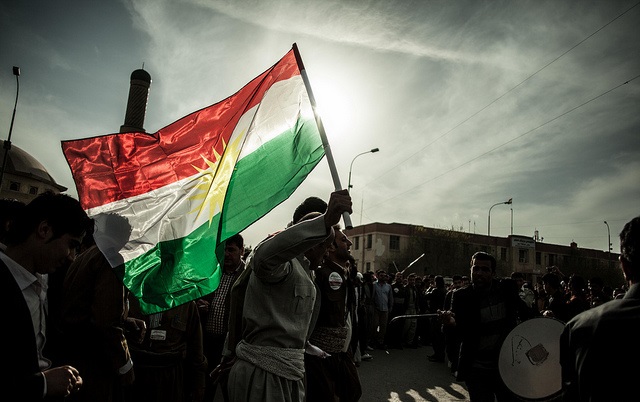Benjamin Netanyahu raised some eyebrows when he expressed a desire for an independent Kurdistan in June. Not only was his speech to a Tel Aviv think tank surprising. It also contradicted current American policy of trying to prevent Iraq from splitting apart. Of course, Israeli-Kurdish solidarity isn’t actually new. Israel has maintained military and financial ties with Kurdish separatists since the 1960s.
Despite fiery rhetoric from Kurdish leaders, it isn’t likely that we’ll see an independent state in the near future, for a host of pragmatic reasons. However, in the event that this changes, to the United States, Kurdistan will effectively become another Israel: A non-Arab state, in the Middle East, requiring heavy US support, both financial and military. In many ways, Kurdistan could become a similar partner for projecting American interests in the region, culturally sympathetic given its underdog status in battling foes like ISIS.
It all depends on how much Washington leverages the relationship, and what the Kurds avail themselves to, in terms of making themselves instrumental to projecting American power in the region. The Kurdish leadership has few options about this. Allying with the US to some degree isn’t really an option, since they are surrounded by hostile states and groups like ISIS that threaten their very survival.
This is in addition to the fact that Kurdish autonomy in Iraq is constantly met with scorn by a hostile government in Baghdad. Indeed, America is an essential lifeline, and its support is almost unavoidable. Still, there are choices to be made about how far the relationship goes, and getting too cozy with Washington is risky. Kurdish leaders should look to Israel in order to understand the complexity of this problem.
Understanding Kurdistan’s potential use as a geopolitical pawn means examining the history of the Kurds’ relationship with Israel, not the US. Israeli military support for the Kurds began in 1965, when Brigadier-General Tzuri Sagi (who nearly masterminded Saddam’s assassination in the 1970s) was sent eastward and became a close friend and adviser to Kurdish nationalist Mustafa Barzani. Sagi was integral in building the Kurdish army, and greatly assisted it through two wars against the Iraqi military.
The relationship was often uneasy, but kept together on the strength of mutual benefits. Israel saw the Kurds as a potential buffer against Arab adversaries, especially Iraq. The plan worked, and was arguably expanded to engage with a newly hostile Iran in the 1980s. The relationship ebbed and flowed though, particularly in relation to Israel’s military cooperation with Turkey. Kurdish separatists similarly found a regional ally in Israel that would allow them to more freely challenge pan-Arabist regimes, and later, make it easier to not take sides in local conflicts like Iraqi sectarianism.
The relationship is unusual for everyone involved, but it continues to serve its purpose, though Israel has many more Arab allies in the region than when it first engaged the Kurds in the 1960s. It just needs the Kurds for different reasons, and there is every reason to believe that this approach will intensify. Israel’s leadership continues to move rightwards, and leaders like Avigdor Lieberman, who is no friend of Ankara, have few qualms about alienating Turkey even further than during the 2010 Gaza flotilla assault.
On their end, Kurdish militants are exploiting the rise of ISIS to seize their historic territory, and need Israel to make independence viable for a host of political and economic reasons. Just one is that Israel would be a reliable market for Kurdish-controlled natural resources and oil.
At his talk, Netanyahu emphasised that an independent Kurdistan would be a crucial part of an alliance of moderate forces in the Middle East. If we decode this language, we are left with an Israeli leader extolling a fetishized Kurdish resistance movement (he called the Kurds “a nation of fighters [who] have proved political commitment and are worthy of independence”) as a potentially useful pillar of his own country’s power in the region.
“Moderate” is obviously a codeword. This rhetoric effectively frames Kurdistan as a potential regional ally that can outflank hostile Arab states, bolstered by its own justifications of historic injustice and the threat of Islamic radicalism. Critically, it would not be a puppet. It would be a useful partner that, in the process of asserting itself, would also help project Israeli national interests, together with American ones. The US understands this, though it’s not clear that it has a plan to distinguish between the two.
This probably reads as speculation. After all, the Obama Administration is responding coolly to the idea of an independent Kurdistan. However, those dynamics could easily change. US ties with Kurdish political and military groups have already increased substantially since the late 1980s. The very existence of Iraq’s Kurdish Autonomous Region is owed to Coalition policy during the occupation. The stage could be set for a future presidency to support Kurdish statehood outright.
This is even more likely if militants are able to secure their hold over important resources, like oil fields. Why can’t the United States pursue the same ties as Israel, for the same justifications, and do it with even more effectiveness since it can use its soft power to secure Kurdish dreams of independence? If that should occur, then the danger is that American sponsorship would ultimately damage Kurdish aspirations for democracy, as it has in other client states. US backing comes with a host of jingoistic and market-driven policies that are extremely difficult to reconcile with a democratic outlook. Israel is as clear an example as any.
The danger is that if the Kurdish-American relationship gets too friendly, we could very well be stuck with another Israel in the Levant. Kurdistan would serve as an aircraft carrier for American interests, shaming the movements for national liberation that created it, and using its friendly relationship with the United States to fuel antagonistic posturing towards its neighbours. The seeds of such a dynamic are already being sown. Kurdish groups have been reporting on their engagements with ISIS as if they are mythologizing a war of independence, forging a vision of modernists carving a new nation in opposition to savage jihadists. This mythology, and emerging nationalist vision, is made easier by regional observers blindly praising armed groups like the Peshmerga, and making a point of noting Kurdish secularism and cosmopolitanism as implicitly defined against jihadi bloodshed.
The current popularity of Kurdish separatist groups is based at least in part in how they do not seem to substantially challenge American hegemony in the region. All that really needs to happen is for these trends to continue evolving, and eventually, solidify in a new Middle Eastern state, as well as US policy towards it. It is impossible to predict when that would occur, or if Kurdish leaders will defy predictions, and sketch out a plan for preventing it.
Photographs courtesy of Mustafa Khayat and jan Sefti. Published under a Creative Commons License.






